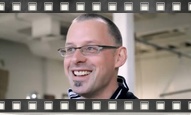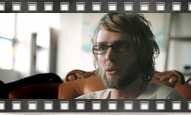2009: Fight for your right to Internet
In 2009, we stormed the lawns of parliament to fight for our rights. British actor Stephen Fry, with 200,000 followers on Twitter, blacked out his picture on the site and posted a message of support. What was up?
Track of the Year 2009

Grayson Gilmour - Loose Change
Late in 2009, I first head tracks off Grayson Gilmour’s ‘No Constellation’ album which was to become the first “new” Flying Nun Records release in 2010. I liked it because, like the track ‘Loose Change’, it was quirky but undeniably poppy. It is unique quality music that I simply had to be involved with as it sounded so different to anything else on the label, or anywhere, that it had to be heard. - Roger Shepherd
[ Watch Video ]
Track of the Year by Records
Limits to our broadband
In 2009, New Zealand was one of only four OECD nations with data caps limiting how much customers could download. Despite these restrictions, there were over a million New Zealanders on broadband by the close of the decade.
We are integrating the Internet ever deeper into our lives and building new and exciting businesses based entirely around it. As Internet capable devices shrink to become netbooks, tablets, smart-phones the Internet is not only on our desktop but everywhere with us.
After a slow uptake from the end of the ‘90s, broadband customer numbers have doubled since 2006 – even if half of these users have caps of 5Gb or less, after which most are reduced back to dial-up speeds or face hefty per megabyte charges.
But these charges are nothing compared with the ‘charges’ that many would have faced if a new law had been enacted in 2009.
Putting an end to piracy?
The use we were putting broadband to was of concern to some parties – many of whom had influence over our government. Such as foreign governments and multinational corporations who all wanted to see music, TV and film downloading stamped out in New Zealand.
The proposed solution? Section 92A – an upgrade to our copyright law – was a ‘three strikes and you’re out’ style law designed to combat digital piracy by forcing ISPs to disconnect a user who was found guilty of downloading copyright materials on multiple occasions (whether the number was 3 or something else, and many other aspects of how to deal with infringers, was confusingly left undefined).
The opposition would call it the ‘Guilt upon Accusation’ law as accusations required no real proof to be provided or trial to be undertaken.
By 2009, it was not a case of if, or even how the music industry would be transformed by online downloads. The film and television industry was at different stages of the ‘how’, but the impact was already being seen. Not all organisations or artists however, were reacting with lawsuits.
The Creative Freedom Foundation was formed in late 2008 to provide visible protest by artists against the law, while still supporting the rights of musicians to make a living from their work. By 2009, thousands of Kiwi artists had signed up.
Kiwis go black to showcase a S92A world
With the passing of the law only weeks away, a larger ‘black-out’ campaign was organised by the Foundation and others to give visibility to the potential impact of the law. Most were not aware that a law that had the potential to drastically impact on their Internet freedom, was about to be enacted.
In February, the campaign saw thousands of websites, blogs and individual’s social network profiles turn black for a week. Notable overseas netizens and celebrities such as Stephen Fry joined the cause. A protest of black placards at parliament cemented media interest and, within a month, the bill was on hold, eventually to be scrapped for a total rewrite.
As human as Internet access
In late 2008, Culture and Heritage Minister Judith Tizard launched a book on the history of the Internet in New Zealand called ’Connecting the Clouds’ written by Keith Newman. She said at the launch that, “The Internet is now so much an essential part of life and commerce that access to it can be seen as ‘a human right’”.
Our reaction to the near-change of our copyright law showed that many of us felt just as strongly about the role of the Internet in our lives. Unfortunately, legally speaking, the Internet was not a human right and, in 2009, there were other challenges to our ability to access it.
Filtering the baby out with the bathwater

Government investment in fibre to the home
The government commits $1.5 billion to boost broadband by laying fibre optic cables to 75 percent of the country’s homes and businesses through a series of regional partnerships.
The second attack on our Internet was markedly less visible and seemingly less controversial. Very few would disagree that blocking access to objectionable material online, such as child pornography, was unwarranted government interference.
Charged with doing this, the Department of Internal Affairs (DIA) set about creating an Internet filter. The proposed system would analyse every website request against a ‘blacklist’ of those sites with pages deemed to be objectionable. When there was a request for a site with an objectionable page (even if other pages on the site were not), it would be forwarded through to the DIA which would log the request and when it was for an actually objectionable page, block it.
As with objections to Section 92A, most focused on the fact that the implementation cast a net too widely. By late 2009, trials of the Internet filter (across many of our largest ISPs) showed that only a quarter of one percent of logged requests were actually for objectionable material.
A goal to open up is made
In a year that restrictions were being placed on what we could do and see online, a growing demand for access to government information and data reached critical mass.
Since the ‘90s, central government departments had shared varying degrees of information through their websites. But many of us knew that both local and central government had at their disposal screeds of useful information, much of which was publicly available offline, but only with significant effort or cost.
The call for ‘Open Data’ was to make this info available online in accessible ways so that we could read and re-purpose it as we saw fit. In 2009, the group Open New Zealand was formed outside government to give a voice to the idea and to catalogue what data was already available across local bodies and departments. Later that year, a similar catalogue was launched from within government.
In a similar vein, the National Library of New Zealand launched the Digital NZ project in 2008 with the aim of making NZ digital content such as documents, photos and videos easy to find, share and use online. The hurdle was the questionable copyright of much of this material. While it could be found, could it be used?
To help rectify this, the government also began exploring how their agencies’ content should be licensed. Proposed in 2009 and approved in 2010, the NZGOAL (Government Open Access and Licensing) stated that, where possible, Creative Commons licenses should be used to ensure that the public could freely use data and content as they liked.
Two wins and a warning
It is ironic that in a year that copyright holders tried to take away our Internet, we had one of our biggest creative successes online. Reservoir Hill, an online-only drama where viewers could interact with the show via text messaging, won an International Digital Emmy. The next year a creative TV campaign for our government owned ISP, Orcon would win a coveted Grand Prix at the Cannes advertising awards. Our Internet was finally, in a way... award winning.
We had won – twice. Section 92A was struck down and we had an Emmy in our hands. But looming on the horizon at the end of the year was the Anti-Counterfeiting Trade Agreement (ACTA), an attempt by major nations and multinationals to enforce a standard set of patent and copyright ‘protection’ measures.
In terms of digital media, this would include Internet monitoring for the trading of copyright material and border searches of iPod and similar devices. Our hard-won internet connection was again threatened. A meeting of countries negotiating the details of ACTA was set to meet in New Zealand in 2010…
What were your
Kiwi Websites of the Year?
Tomorrow: The future is written by the victors. Be a winner and have your say in tomorrow's chapter.
All
Anecdote
Event




